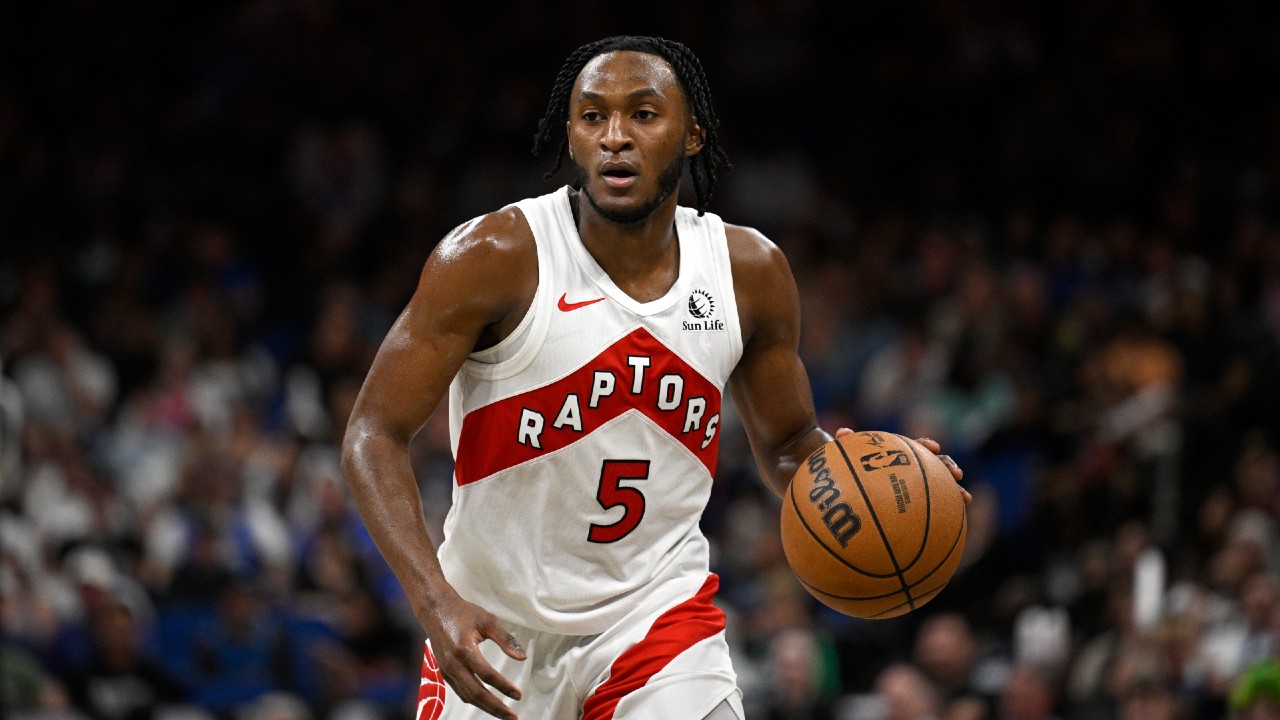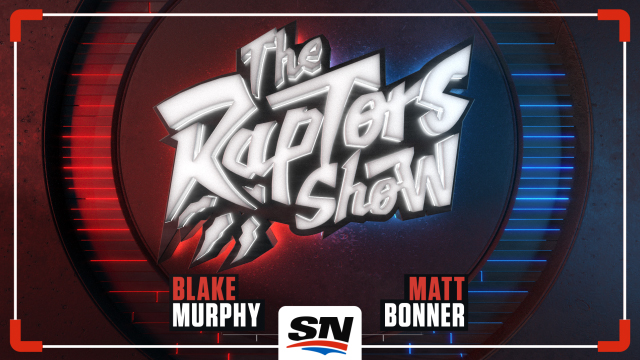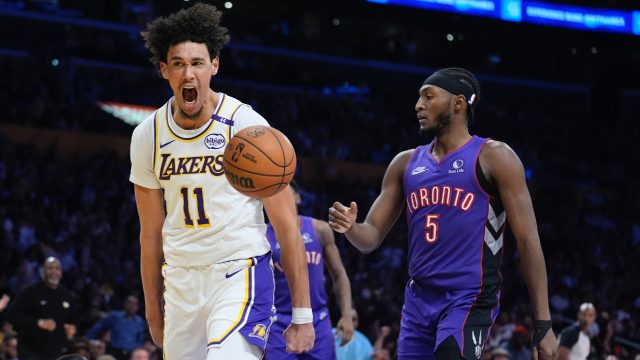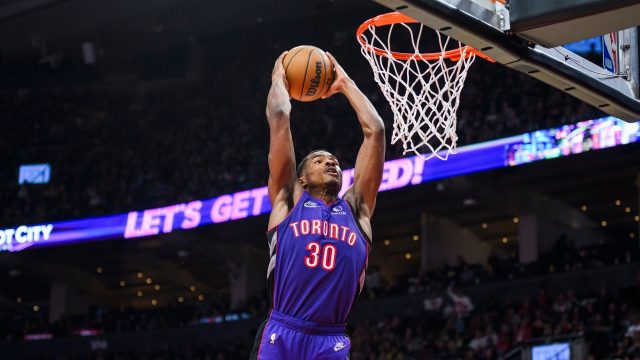
The NBA season is inching towards the one-month mark and through it, the Toronto Raptors have been an interesting team to follow.
Although they may not be winning many games — 2-9 so far and last place in the Eastern Conference — games have been routinely competitive and the rebuilding squad has, instead, been stacking developmental victories.
Which is why Toronto’s first NBA Cup game of the season on Tuesday should be intriguing. The Raptors visit a struggling Bucks squad for the first of four group-stage games, hoping for a better showing than last year’s 1-3 record. It’s a prime opportunity to make a statement against Giannis Antetokounmpo’s 2-8 squad.
Win or lose, this Raptors team has already looked much better as an on-court product than last year’s 25-57 squad, even if the results have generally been the same. And while an 11-game sample size won’t punctuate any delusions of grandeur, it’s at least enough to identify trends worth tracking as the campaign unfolds.
Whether they’re overreactions or accurate reads will only become clear as the season continues. In the meantime, here are early player and team trends from the 2024-25 Raptors.
RJ Barrett‘s leap appears to be legit
Look away Knicks fans, the “Maple mamba” is home and living up to the billing of a third-overall pick the likes of which New York hoped for when drafting him out of Duke in 2019.
Barrett’s biggest knock in the concrete jungle was a lack of consistency, showing glimmers of brilliance that kept fizzling out. And when his early Raptors tenure included averaging a career-high 21.8 points per game and knocking down a hyper-efficient 39 per cent of his threes, it sparked the same question: was it yet another flash in the pan or was this the Barrett fans should expect moving forward?
Since his 2024-25 season debut — he missed the first three games with a shoulder injury — the sixth-year guard has dispelled any concerns. Playing in coach Darko Rajakovic’s ball-movement offence has not only elevated his scoring ability — averaging a team-best 23.1 points per game as one of the most impactful drivers in the NBA — it’s unveiled a playmaker prowess previously unseen.
With Scottie Barnes and Immanuel Quickley dealing with injuries, the Raptors have opted to operate through Barrett, and while the Canadian is in uncharted territory, he’s thriving. He is averaging a career-high 6.1 assists a game (25th in the NBA), with a 96th percentile usage rate and 94th percentile assist percentage. Before this year Barrett had not amassed nine assists at any point in the league. He’s now done it twice through eight games this season.
It’s not just that he’s moving the ball. Fans saw plenty of his drive-and-kick game last year. Barrett has operated in new spaces and has had to read defences this season, and so far, it’s led to positive outcomes. He’s generating 7.3 points per game as a pick-and-roll ball-handler (15th in the NBA), nearly five points better than last year.
When “Star-J” isn’t bowling his way to the rim, he’s evaluating the defence in order to find his bigs in the short roll or to make skip passes to the opposite corner. And while it’s unclear how much of his increased scoring or playmaking load continues once Barnes and Quickley are back in the mix consistently, the Raptors developing another competent initiator through their absence is a major plus.
It’s a big reason why Barrett is currently second in Most Improved Player of the Year odds (+700 via BetMGM).
Will it last? We’re nearing a 40-game sample size between two seasons of him leading the Raptors in scoring, averaging 22.5 points on 56.8 per cent true shooting in that span. I’m willing to give him the benefit of the doubt at this point.
Gradey Dick is turning into an elite three-level scorer
After a rookie campaign that required mid-season intervention in order to turn it around, not many foresaw this kind of leap from the 20-year-old.
Most expected Dick’s goal this year to simply be solidifying his place in the starting lineup, instead, he’s evolved into a remarkable scorer — one that should be able to scale down his game once the team is healthy.
Dick is averaging 19.0 points per game, leading all sophomores, on an excellent 58.4 per cent true shooting. He’s routinely taking advantage of his 37 per cent conversion rate from distance, bending defences with his shooting gravity and attacking closeouts with supreme confidence.
And when he’s not spotting up for threes or blowing by defenders for acrobatic layups, Dick is taking a couple of dribbles and settling into mid-range jumpers, an area he’s been elite at this season. He is shooting 58 per cent on mid-range attempts this year which is 95th percentile amongst NBA wings (per Cleaning the Glass).
It’s gotten to the point where teams have him second on the scouting report behind Barrett, with defenders opting to face away from the ball and focus on him just to avoid even the smallest of slip-ups for the former 13th-overall pick to leverage.
Will it last? It’s unlikely he takes the second-most shots on the team once the squad is fully healthy. So, his raw statistical production likely goes down and I doubt he stays in the top 10 for MIP odds all season.
However, his impact shouldn’t diminish. What’s made this run impressive is how Dick has gotten his looks. It’s generally been within the flow of the offence, running off screens or relocating into open spots without relying on set action.
He’s constantly moving — 25th in the NBA for miles travelled on the court — and that activity and defence-altering impact should be sustained regardless of the personnel. If anything, the return of Quickley, and eventually Barnes, means more openings and better passers to feed him the ball.
Depth stepping up through injuries
Rarely are there positives when a team is as injured as the Raptors have been so far. Just ask anyone who watched the equally, if not more, injury-raved Raptors last year.
But even though Toronto has had as many as seven players out of the lineup at one point — with Barnes, Bruce Brown, Kelly Olynyk and Ja’Kobe Walter currently unavailable — the silver lining has been the depth of the roster making the most of the opportunity.
While Walter has battled a shoulder injury and only played in four games, the rookie trio of Jonathan Mogbo, Jamal Shead and Jamison Battle have all stepped up at one point or another. All three are top 15 in points per game amongst rookies with Shead second in assists, Mogbo second in steals and Battle fourth in three-point percentage (minimum three attempts per game).
It’s giving “bench mob” flashbacks of when Delon Wright, Fred VanVleet, Pascal Siakam, and Norman Powell were holding down the second unit.
It hasn’t just been the rookies though. Ochai Agbaji and Chris Boucher have also made their presence felt through the first month.
Agbaji’s first year in Toronto was disappointing, averaging 6.7 points per game on a dismal 21.7 per cent shooting from beyond the arc after being acquired at the trade deadline. Fast forward and the third-year wing is up to 14 points per game on a much-improved 47.7 per cent from distance.
His shot diet is nearly identical, with a slight uptick in corner-three frequency — and converting at an elite 62 per cent from the corners this year — but more than anything, the confidence is evident and execution is sharper. He’s eclipsed 20 points twice in the Raptors’ last five games, not having done it once through 27 contests last year.
Boucher is back in the Raptors rotation after watching his fair share of games from the bench last season. Injuries have opened up minutes for the Montreal native and he’s reminded the coaching staff of the energy he can bring off the bench, averaging 11.5 points per game. It’s his best scoring season since 2020-21 and the Raptors’ offensive rating has been nearly eight points better with him on the floor because of it.
Will it last? I lean towards this being fool’s gold. The rookies will likely see far fewer minutes once the squad is at full strength and with the Raptors 905 campaign now underway. It’s also hard to believe Agbaji’s efficiency can stay that high for a full season but I’d gladly accept being wrong about that.
The defence is bad…again
In training camp, Rajakovic harped about Toronto’s new defensive philosophy of hounding ball handlers and focusing on the point of attack. And while the eye test shows the team is hustling plenty, sixth in deflections per game, all that funnelling away from the perimeter has basically rolled a red carpet to the rim.
Over 60 per cent of opponent shot attempts are coming from inside the arc, which leads the league, and on those looks the Raptors are allowing a 54.9 per cent conversion rate (sixth-highest). Which is why it’s no surprise that they have the 29th-ranked defensive rating, somehow worse than last year at 25, and are allowing the second-most points per game (122.7).
Jakob Poeltl has been an unfortunate casualty of all the rim-running as he’s been caught in less-than-ideal positions due to his lack of mobility, unable to deter much of anything at the basket as a result. Subsequently, Toronto’s defence has been six points worse with the usually stout defender on the floor.
The young Raptors haven’t done themselves any favours either, as the increased ball pressure has led to an uptick in self-inflicted errors. The team is fouling opponents 25.9 times a game on average, the most in the NBA.
If it wasn’t for the Raptors’ offence ranking in the top half of the NBA this season, averaging the sixth-most points per game, most of their games wouldn’t be as close as they’ve been.
Will it last? It’s hard to see how the Raptors’ defence improves much with the personnel on the roster. Barnes returning will make a difference but even he can’t patch all the holes this defence has right now.
The under looks all but inevitable
It may be too soon to start crunching lottery odds but things certainly appear to be trending in that direction.
As things stand, the Raptors are on pace for just 18 wins. That would be the second-fewest in franchise history and least since the 1997-98 season when they won 16 games.
The over-under line (per BetMGM) was set at 29.5 entering the year and given the slew of injuries and strength of schedule thus far, it’s hard to see where those wins come from.
March offers a “favourable” stretch with two games against the Utah Jazz (2-7), three against the Washington Wizards (2-6) and a game each against the Portland Trailblazers (3-8), Brooklyn Nets (4-6) and Charlotte Hornets (4-6), but with a 2-9 record and still in search of its first road win a month into the season, Toronto is in no position to consider any opponent as a walk in the park.
Will it last? Entering the season I said if the team was healthy, it is talented enough to reach 30 wins. And while I stand by that sentiment, injury-luck hasn’t done that prediction any favours, and at a certain point, jockeying for draft position will outweigh winning inconsequential games.
There is still hope for over-bettors, however, as the Raptors haven’t had back-to-back sub-30 win seasons since 2010-12, the second of which was a shortened 66-game schedule. It hasn’t happened in consecutive 82-game campaigns in over 20 years. So, if history is any indicator, it’s not likely the Raptors sink below 30 wins this year unless they truly are one of the worst (statistical) teams in franchise history.








